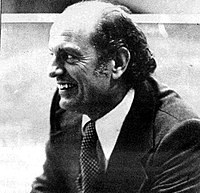Montevidéu (Uruguai), 1926 – Mejorana del Campo (Espanha), 1983
Flávio Aguiar

While living in Uruguay, Ángel Rama engaged in a wide range of activities: he was a professor, journalist, editor, fiction writer, playwright, and carried out significant work in organization and research at the National Library. He collaborated with, animated, and edited the literary pages of the weekly Marcha during the years 1949 and 1950 and then from 1958 until its closure during the military dictatorship.
Starting in the 1960s, Rama considerably expanded his scope of work, teaching courses, participating in meetings, and publishing articles in various countries across Latin America.
When the military coup occurred in Uruguay in 1973, he was in Venezuela, where he settled, obtaining Venezuelan citizenship in 1977, as Uruguay had denied him passport renewal. He taught courses and gave lectures in the United States, France, and Brazil. In 1979, he went to the University of Maryland in the United States, where he also worked at Middlebury College and the following year at Princeton University.
He collaborated with the magazine Casa de las Américas. However, in 1982, by which time he was a full professor of Latin American Literature at Maryland, his request for a new visa was denied by the U.S. government. Forced to leave the country in early 1983, he traveled to Caracas, gave lectures in Europe, and taught a course at the State University of Campinas (Unicamp) in Brazil.
He decided to settle in Paris. In November, he attended a colloquium in Madrid and then traveled with his wife, Marta Traba, to Bogotá, when the plane they were on crashed shortly after takeoff.
Ángel Rama dedicated his life to researching and demonstrating the existence of a Latin American literature and culture. He was an ardent polemicist and regularly published essays in magazines, newspapers, and other periodicals; his bibliography records over 1,400 articles, not counting prefaces and contributions to collective works.
Among his most important books are Diez problemas para el narrador latinoamericano (1972), La generación crítica (1939-1969) (1972), Los gauchipolíticos rioplatenses. Literatura y sociedad (1976), Transculturación narrativa en América Latina (1982), and La novela latinoamericana. Panoramas 1920-1980 (1982).


